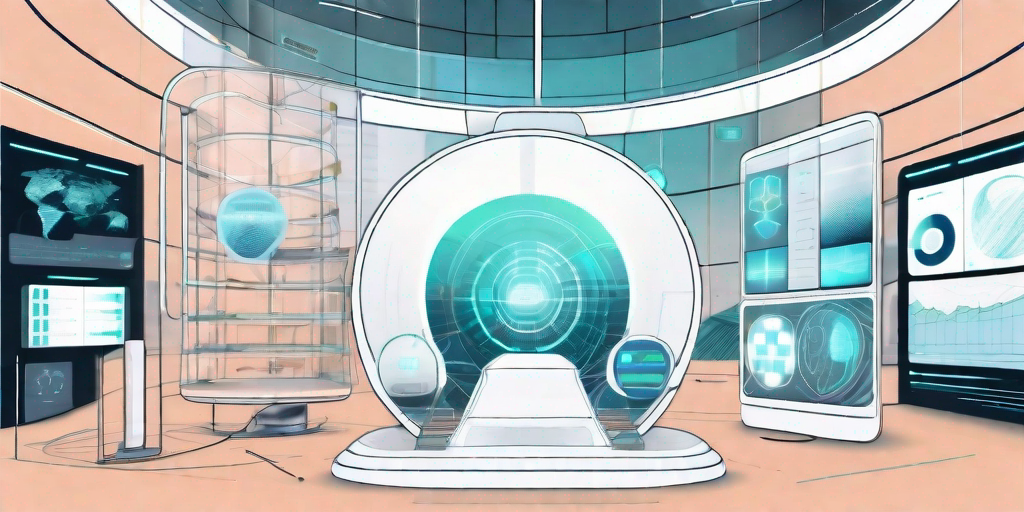Understanding Digital Health through an Innovation Futurist's Lens

Understanding Digital Health through an Innovation Futurist's Lens
In today's fast-paced world, the field of healthcare is constantly evolving. New technologies and innovations are reshaping the way we approach health and wellness, and digital health is at the forefront of this transformation. But what exactly does digital health entail? And how can we make sense of this rapidly changing landscape? To answer these questions, we need to look through the lens of an innovation futurist.
The Role of Digital Health in Modern Healthcare
Digital health encompasses a wide range of technologies and practices that leverage digital tools to improve healthcare delivery. From wearable devices that track our heart rate and sleep patterns, to telehealth platforms that allow us to consult with doctors remotely, digital health has the potential to revolutionize how we access and receive care.
One of the key roles of digital health is to empower individuals in managing their own health. Through smartphone apps and connected devices, people can monitor their vital signs, track their physical activity, and even receive personalized recommendations for improving their well-being. This shift from passive patients to active participants is a significant step forward in preventive care and overall health management.
Digital health also plays a crucial role in enhancing patient care and communication. Electronic medical records enable healthcare providers to access and share patient information more efficiently, leading to better coordination of care and reduced medical errors. Furthermore, telemedicine platforms allow for remote consultations, making healthcare more accessible to those in rural or underserved areas. By breaking down geographical barriers, digital health has the potential to improve healthcare equity and outcomes for all.
Moreover, the integration of artificial intelligence (AI) and machine learning algorithms in digital health has opened up new possibilities for personalized medicine. These technologies can analyze vast amounts of patient data to identify patterns and predict health outcomes, enabling healthcare professionals to tailor treatment plans to individual needs. For example, AI-powered algorithms can help identify patients at high risk of developing chronic conditions, allowing for early intervention and preventive measures.
In addition to individual health management, digital health has also revolutionized the way healthcare providers collaborate and share knowledge. Online platforms and forums provide a space for healthcare professionals to exchange ideas, discuss challenging cases, and seek advice from experts around the world. This global network of knowledge-sharing fosters continuous learning and innovation, ultimately benefiting patients by ensuring that healthcare providers stay up-to-date with the latest advancements in their fields.
Furthermore, digital health has proven to be a valuable tool in public health initiatives. Through data analytics and surveillance systems, public health agencies can monitor population health trends, detect disease outbreaks in real-time, and implement targeted interventions. For instance, during the COVID-19 pandemic, digital contact tracing apps have been used to identify and notify individuals who may have been exposed to the virus, helping to contain its spread.
As digital health continues to evolve, the potential for its impact on healthcare is vast. From empowering individuals to improving patient care, enhancing communication, enabling personalized medicine, fostering collaboration among healthcare professionals, and supporting public health initiatives, digital health is reshaping the landscape of modern healthcare. With ongoing advancements and innovations, we can expect digital health to play an even more significant role in the future, transforming the way we approach and experience healthcare.
How an Innovation Futurist Can Decode Digital Health
While the concept of digital health may seem overwhelming, an innovation futurist can help us navigate through this complex landscape. An innovation futurist is a visionary who can anticipate emerging trends and identify opportunities for transformative change. In the realm of digital health, they have the ability to decode the potential of technology and apply it in practical and meaningful ways.
An innovation futurist possesses a deep understanding of technology trends and their implications for healthcare. They stay up to date with the latest advancements in artificial intelligence, machine learning, and data analytics, and use this knowledge to envision new possibilities for improving health outcomes. By analyzing patterns and connecting the dots, they can help us navigate the maze of digital health and make informed decisions about the technologies we adopt.
Furthermore, an innovation futurist brings a human-centered approach to digital health. While technology is a powerful tool, it is ultimately the people who benefit from it. An innovation futurist considers the needs and experiences of patients, healthcare providers, and other stakeholders, ensuring that technology is designed and implemented in a way that is accessible, inclusive, and user-friendly. By putting people at the center of the innovation process, they help us create solutions that truly make a difference in people's lives.
One area where innovation futurists excel is in the realm of personalized medicine. With advancements in genomics and wearable technology, the potential for tailoring healthcare to an individual's unique genetic makeup and lifestyle is becoming a reality. An innovation futurist can help decipher the vast amount of data generated by these technologies and translate it into actionable insights for patients and healthcare providers. By leveraging the power of data analytics and predictive modeling, they can identify patterns and trends that may not be immediately apparent, leading to more accurate diagnoses and targeted treatment plans.
Another key role of an innovation futurist in digital health is in the area of telemedicine. With the increasing demand for remote healthcare services, innovation futurists are at the forefront of developing and implementing virtual care solutions. They understand the importance of creating seamless and secure platforms that enable patients to connect with healthcare professionals from the comfort of their own homes. By leveraging technologies such as video conferencing, remote monitoring devices, and mobile apps, innovation futurists are revolutionizing the way healthcare is delivered, making it more accessible and convenient for patients, especially those in rural or underserved areas.
Moreover, innovation futurists play a crucial role in addressing the ethical and privacy concerns associated with digital health. As technology continues to advance at a rapid pace, it is essential to ensure that patient data is protected and used responsibly. Innovation futurists work closely with policymakers, healthcare organizations, and technology developers to establish guidelines and best practices for data security and privacy. By advocating for transparency and accountability, they help build trust between patients and the digital health ecosystem, fostering a safe and secure environment for the exchange of sensitive medical information.
In conclusion, an innovation futurist is a vital partner in the journey towards a digitally transformed healthcare system. Their ability to decode the potential of technology, consider the human element, and address ethical concerns makes them invaluable in navigating the complex landscape of digital health. By collaborating with innovation futurists, we can harness the power of technology to improve health outcomes, enhance patient experiences, and ultimately create a healthier future for all.
The Impact of Technology on Health Services
The impact of technology on health services cannot be overstated. From streamlining administrative tasks to revolutionizing diagnostics and treatment, technology has the potential to transform every aspect of healthcare delivery.
One area where technology is making a significant impact is in the realm of personalized medicine. Through genomics and bioinformatics, we can now analyze an individual's genetic makeup and tailor their treatment accordingly. This not only improves outcomes but also reduces the risk of adverse reactions to medications. Furthermore, advancements in robotic surgery and minimally invasive procedures have made surgeries safer and more precise, leading to faster recovery times and improved patient satisfaction.
Technology is also reshaping how we access and receive healthcare services. Telemedicine, for example, allows patients to consult with doctors remotely, saving both time and money. Similarly, digital health platforms enable patients to access their medical records, schedule appointments, and communicate with their healthcare providers more conveniently. These advancements not only improve patient convenience but also free up healthcare resources and reduce waiting times for in-person visits.
Moreover, the integration of artificial intelligence (AI) in healthcare has opened up new possibilities for diagnosis and treatment. AI algorithms can analyze medical images, such as X-rays and MRIs, with incredible accuracy, assisting radiologists in detecting abnormalities that may have been missed. Additionally, AI-powered chatbots can provide patients with immediate responses to their health-related queries, offering reassurance and guidance even outside of regular office hours.
Furthermore, wearable devices and mobile health applications have empowered individuals to take control of their own health. With the help of fitness trackers, people can monitor their physical activity, heart rate, and sleep patterns, gaining insights into their overall well-being. These devices can also alert users to potential health issues, such as irregular heart rhythms or high blood pressure, prompting them to seek medical attention promptly.
Lastly, technology has the power to revolutionize healthcare research and development. From drug discovery to clinical trials, technology enables scientists and researchers to gather and analyze vast amounts of data, speeding up the development of new treatments and interventions. This data-driven approach to research has the potential to unlock new insights and solutions to some of the most challenging health problems we face today.
In conclusion, technology has brought about remarkable advancements in the field of health services. From personalized medicine to telemedicine, AI integration, wearable devices, and data-driven research, technology is reshaping the way healthcare is delivered, accessed, and researched. As technology continues to evolve, the possibilities for improving healthcare outcomes and patient experiences are endless.
Frequently Asked Questions
What is digital health and how does it impact healthcare?
Digital health refers to the use of digital tools and technologies to improve healthcare delivery. It encompasses a wide range of technologies, such as wearable devices, telehealth platforms, and artificial intelligence. Digital health has the potential to empower individuals in managing their own health, enhance patient care and communication, enable personalized medicine, foster collaboration among healthcare professionals, and support public health initiatives.
What is the role of an innovation futurist in understanding digital health?
An innovation futurist is a visionary who can anticipate emerging trends and identify opportunities for transformative change in the realm of digital health. They possess a deep understanding of technology trends and their implications for healthcare. An innovation futurist helps navigate the complex landscape of digital health, considers the human element, addresses ethical concerns, and collaborates with stakeholders to harness the power of technology for improved health outcomes and experiences.
How does technology impact health services?
Technology has a profound impact on health services, revolutionizing every aspect of healthcare delivery. It enables personalized medicine through genomics and bioinformatics, improves access to healthcare services through telemedicine and digital health platforms, enhances diagnosis and treatment through artificial intelligence, empowers individuals to take control of their own health through wearable devices, and accelerates research and development through data-driven approaches.
Contact an Innovation Futurist for Your Event
If you're looking for a visionary speaker who can decode the complex landscape of digital health and shed light on the future of healthcare, Dr Mark van Rijmenam is your ideal choice. With his deep understanding of technology trends and their implications for healthcare, he can help your audience navigate the maze of digital health and make informed decisions about the technologies they adopt. Dr van Rijmenam brings a human-centered approach to digital health, ensuring that technology is designed and implemented in a way that is accessible, inclusive, and user-friendly. He can provide valuable insights on personalized medicine, telemedicine, and the ethical concerns associated with digital health. Don't miss the opportunity to have Dr van Rijmenam at your next event. Simply complete the form below and we will be in touch within 24 hours. Let's harness the power of technology to improve health outcomes, enhance patient experiences, and ultimately create a healthier future for all.





